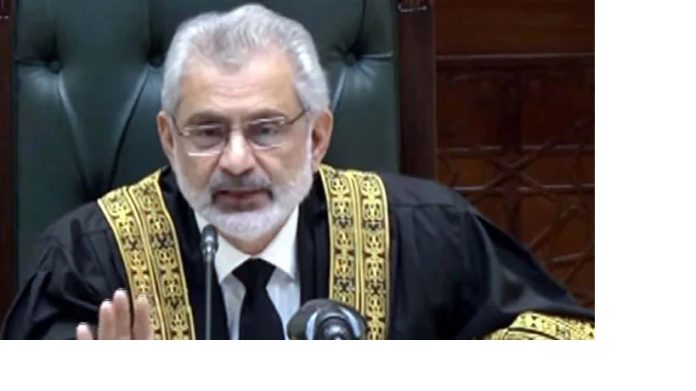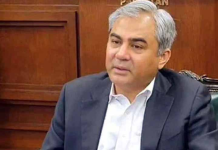dna
ECP has challenged constitution of election tribunals by LHC for hearing pleas regarding Punjab’s constituencies
ISLAMABAD: Chief Justice of Pakistan (CJP) Qazi Faez Isa on Thursday called the presidential ordinance an insult to the parliament as the Supreme Court rejected the Election Commission of Pakistan’s (ECP) plea in the election tribunals case.
“[Presidential] ordinance is an insult to the parliament when it has already made a law [on an issue],” the top judge said while hearing ECP’s plea against the constitution of election tribunals by the Lahore High Court (LHC).
The case, heard by a two-member bench comprising the CJP and Justice Naeem Akhtar Afghan, has been sent to the three-member SC committee for the constitution of a larger bench.
The ECP had moved the apex court under Article 185(3) of the Constitution against the LHC’s May 29 verdict wherein it had constituted eight election tribunals.
The order of the court’s single-member bench comprising LHC CJ Malik Shahzad Ahmad provisioned that Justice Shahid Karim, Justice Ch Muhammad Iqbal, Justice Anwaar Hussain, and Justice Sultan Tanvir Ahmad would hear the election petitions at the LHC principal seat in Lahore.
Whereas Justice Asim Hafeez will hear the election petitions at the LHC Bahawalpur bench, Justice Sardar Muhammad Sarfraz Dogar and Justice Raheel Kamran will hear the election petitions at the LHC Multan bench, and Justice Mirza Viqas Rauf will hear the election petitions at the LHC Rawalpindi bench.
The order, which came in response to petitions filed by Rao Hashim Omar Khan and others, had also ordered the ECP to appoint six more judges, nominated by the LHC chief justice, as election tribunals.
It is pertinent to mention here that two out of the eight election tribunals were already working in Punjab.
In response, the electoral body, in its appeal filed in the SC, sought leave to appeal against the impugned judgment of the LHC contending that under Article 219 read with Article 222(b) of the Constitution, the power to appoint the election tribunals was vested in the electoral body.
The ECP had further argued that Article 219 of the Constitution did not expressly require the body to consult the relevant high court’s chief justice for appointing election tribunals or for allocating territorial jurisdiction to such election tribunals.
Section 140(3) of the Elections Act 2017 only required consultation with the chief justice of the high court concerned on the appointment of sitting high court judges as election tribunals, but this consultation did not cover the allocation of territorial jurisdiction to the election tribunals which was the sole power and prerogative of the Election Commission, as was evident from Section 140(1) read with Section 151 of the Elections Act 2017, the petition stated.
During the hearing today, CP Isa questioned how the ECP was issuing presidential ordinance and wondered why the electoral body didn’t meet the LHC CJ.
“Nowhere is it written in the Constitution that one cannot meet a judge […] why is the ECP controversial?” the top judge remarked.
Responding to the chief justice’s comments, ECP’s lawyer Sikandar Bashir said that he didn’t legislate the law on the ordinance and that he wasn’t defending the ordinance at all.
“The ordinance was promulgated in light of the existing burden [of cases] on the judiciary,” the lawyer said.
He also apprised the court that the ECP had written to the LHC under Section 140 of the Election Act seeking a list of serving and retired judges’ names.
Referring to the CJP’s remarks regarding parliament’s insult, the counsel maintained that he wasn’t representing the federation.
When asked by the CJP whether the LHC’s verdict was in accordance with the law, the counsel answered in the affirmative.
Meanwhile, representing the Pakistan Tehreek-e-Insaf (PTI) in this case, Barrister Salman Akram Raja apprised the court that the ordinance on the said issue has been challenged in Islamabad High Court (IHC) and the LHC.
To this, the CJP questioned why it was challenged in different high courts as the ordinance would be enforced throughout the country.
“We cannot issue a notice as the ordinance hasn’t been challenged in the SC,” he said.
The chief justice further remarked that the issue concerning Form 45 is currently in an election tribunal and the apex court would review the relevant law if the issue eventually comes before them.

















